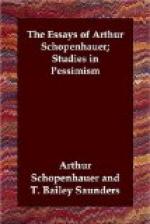[Footnote 1: See Parerga, vol. i. pp. 139 et seq.]
Even though Leibnitz’ contention, that this is the best of all possible worlds, were correct, that would not justify God in having created it. For he is the Creator not of the world only, but of possibility itself; and, therefore, he ought to have so ordered possibility as that it would admit of something better.
There are two things which make it impossible to believe that this world is the successful work of an all-wise, all-good, and, at the same time, all-powerful Being; firstly, the misery which abounds in it everywhere; and secondly, the obvious imperfection of its highest product, man, who is a burlesque of what he should be. These things cannot be reconciled with any such belief. On the contrary, they are just the facts which support what I have been saying; they are our authority for viewing the world as the outcome of our own misdeeds, and therefore, as something that had better not have been. Whilst, under the former hypothesis, they amount to a bitter accusation against the Creator, and supply material for sarcasm; under the latter they form an indictment against our own nature, our own will, and teach us a lesson of humility. They lead us to see that, like the children of a libertine, we come into the world with the burden of sin upon us; and that it is only through having continually to atone for this sin that our existence is so miserable, and that its end is death.
There is nothing more certain than the general truth that it is the grievous sin of the world which has produced the grievous suffering of the world. I am not referring here to the physical connection between these two things lying in the realm of experience; my meaning is metaphysical. Accordingly, the sole thing that reconciles me to the Old Testament is the story of the Fall. In my eyes, it is the only metaphysical truth in that book, even though




